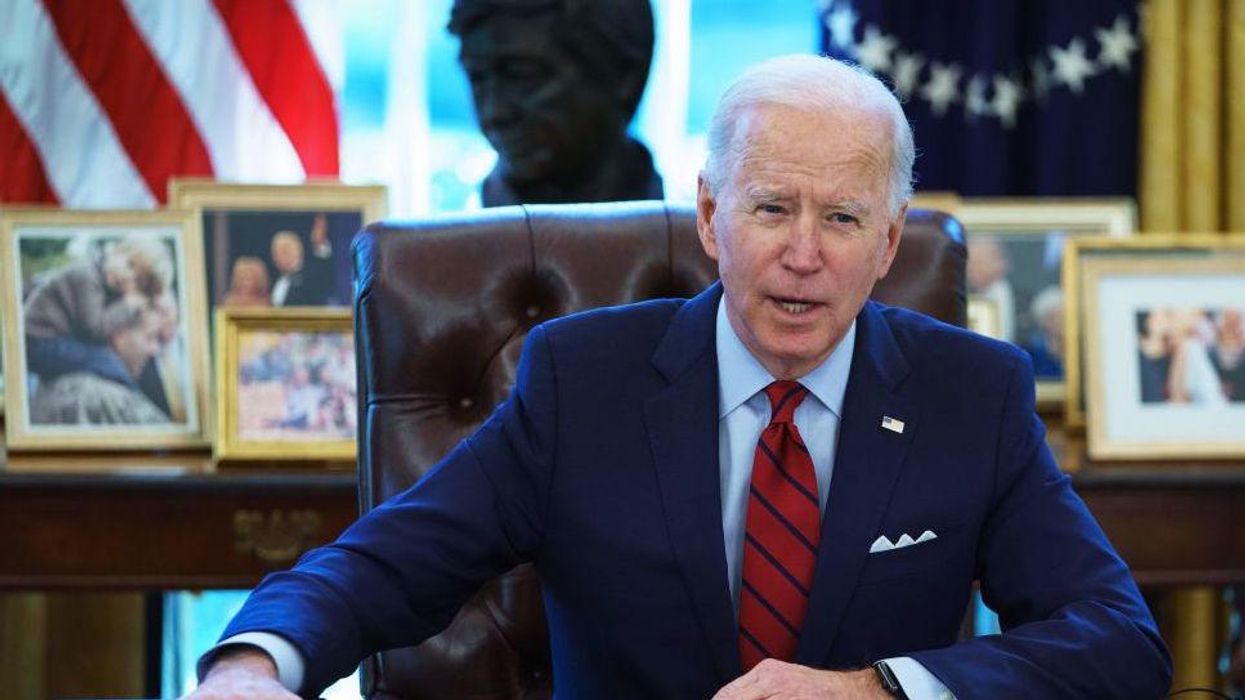
MANDEL NGAN/AFP via Getty Images

Huge constitutional implications
President Joe Biden's administration is urging the Supreme Court to impose restrictions on the Fourth Amendment protections and permit what Forbes described as "warrantless gun confiscation."
The news comes at the same time the White House confirmed Biden will sign an executive order on gun control.
The Supreme Court will hear oral arguments on Wednesday for a case — Caniglia v. Strom — that will ultimately determine whether the "community caretaking" exception to the Fourth Amendment's prohibition against warrantless searches and seizures extends to private residences.
The case stems from a 2015 incident in which police deceptively seized firearms from a Rhode Island couple — Kim and Edward Caniglia — who had engaged in a heated argument. Neither Kim nor Edward were ever accused of a crime, nor was either person ever deemed to be an imminent threat to themselves or others. Police argued they seized the firearms from the couple under the "community caretaking" exception to the Fourth Amendment.
The exception was established by the Supreme Court in a 1973 case. According to Forbes, the exception "was designed for cases involving impounded cars and highway safety, on the grounds that police are often called to car accidents to remove nuisances like inoperable vehicles on public roads." The court "went to special lengths to be clear that the community caretaking exception only extended to vehicles," according to Law.com, even stating there is a "constitutional difference" between homes and vehicles.
But in Caniglia's case, both a federal district court and the First Circuit Court of Appeals ruled the "community caretaking" exception was valid.
"We hold today — as a matter of first impression in this circuit — that this measure of protection extends to police officers performing community caretaking functions on private premises (including homes)," the appeals court ruled.
Despite Caniglia's lawyers warning that extending the "community caretaking" exception would be an "anathema to the Fourth Amendment," attorneys with Biden's Justice Department filed an amicus brief — the first one of Biden's administration — asking the Supreme Court to uphold the appeals court's ruling.
They wrote:
The touchstone of the Fourth Amendment is reasonableness. For criminal investigations, this Court has generally incorporated the Warrant Clause into the Fourth Amendment's overarching reasonableness requirement, but it has not generally done so for searches or seizures objectively premised on justifications other than the investigation of wrongdoing. The ultimate question in this case is therefore not whether the respondent officers' actions fit within some narrow warrant exception, but instead whether those actions were reasonable. And under all of the circumstances here, they were.
The attorneys further argued that warrants should not be "presumptively required when a government official's action is objectively grounded in a non-investigatory public interest, such as health or safety."
If the Supreme Court rejects the lower court's ruling that the warrantless seizure was legal under the "community caretaking" exception, the Biden administration lawyers suggested the court uphold the ruling "by concluding that the officers are entitled to qualified immunity."
A joint amicus brief filed by the ACLU, Cato Institute, and American Conservative Union warned of the constitutional dangers that would follow if the Supreme Court extends the "community caretaking" exception.
"Extending the 'community caretaking' exception to warrantless searches of the home would allow police officers to bypass the Fourth Amendment's restrictions in a startling array of circumstances," the organizations warned.
"These are not theoretical concerns. In both state and federal courts, everything from loud music to leaky pipes have been used to justify warrantless invasion of the home. Allowing ill-defined notions of 'community caretaking' to override the Fourth Amendment is unwise, unmanageable, and unnecessary, and it opens the door to abusive police conduct, including against those who most need society's protections," they continued.
"[We] urge the Court to keep the 'community caretaking' exception confined to its historic, vehicle-related origins and reject a broader standard that would give police free rein to enter the home without probable cause or a warrant, whenever they think it is 'reasonable' to do so," they said.